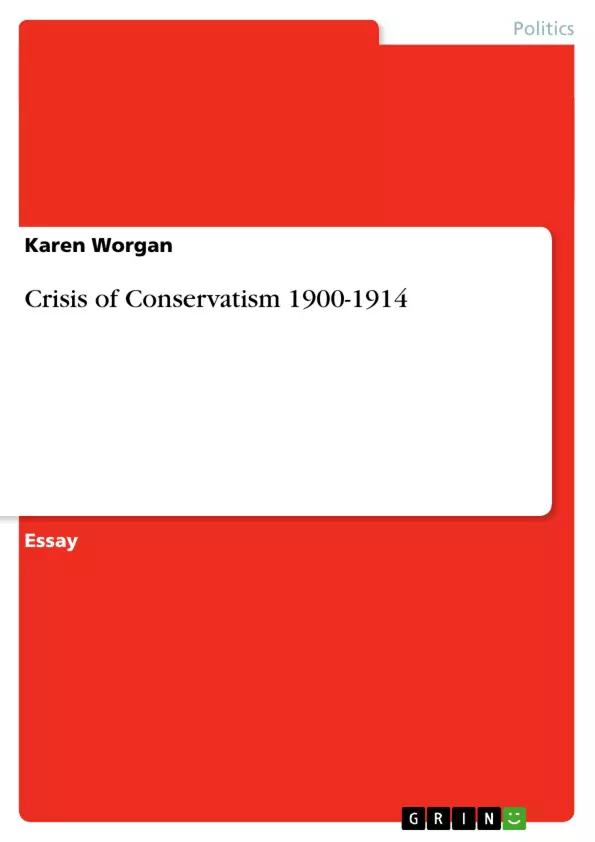How appropriate is it to view the period between c1900 and c1914 as representing a crisis of Conservatism? Why did the movement for Tariff Reform cause so much debate within British politics at this time?
This essay researches the supposed decline of the British Conservative party (Unionists) from the turn of the 20th century to the outbreak of World War 1. It focuses on the weakness or Prime Minister Balfour and the inparty fighting brought about by Joseph Chamberlain's pursuit of tariff reform.
Inhaltsverzeichnis (Table of Contents)
- Introduction
- The Conservative Party and its Record
- Salisbury and the Legacy of the Boer War
- The Rise of Labour and the Taff Vale Decision
- Balfour and the Education Act
- Joseph Chamberlain and Tariff Reform
- The Tariff Commission and the Chinese Labour Controversy
- Balfour's Resignation and the 1906 General Election
- Campbell-Bannerman's Leadership
Zielsetzung und Themenschwerpunkte (Objectives and Key Themes)
This essay examines the period between 1900 and 1914, exploring the contention that this period was marked by a "crisis of Conservatism" in British politics. The primary objective is to assess the validity of this claim by analyzing key factors that impacted the Conservative party's fortunes during this era. The essay aims to shed light on the party's structural and transitional phase during this period, highlighting the influence of leadership, policy decisions, and the emergence of a stronger opposition.- Conservative party's record in government
- The impact of the Boer War on Conservative politics
- The rise of Labour and its challenges to the Conservative party
- The controversy surrounding tariff reform and its effect on Conservative unity
- The role of leadership and policy decisions in shaping the Conservative party's fortunes
Zusammenfassung der Kapitel (Chapter Summaries)
The initial chapters provide an overview of the Conservative party's dominant position in British politics during the late 19th century, highlighting their electoral successes and enduring presence. The essay then examines the legacy of the Boer War, demonstrating its influence on the Conservative party's appeal to the working class through a platform of national loyalty and patriotism. The rise of Labour and the Taff Vale ruling, which weakened the power of unions, are discussed as crucial developments that spurred the Labour party's growth. The following chapters delve into the period of Arthur Balfour's leadership, analyzing the introduction of the Education Act and its impact on various political groups. The essay then explores the complexities of Joseph Chamberlain's tariff reform proposals and their divisive impact on the Conservative party, culminating in Balfour's resignation. Finally, the chapter on Campbell-Bannerman's leadership emphasizes the Liberal party's electoral triumph in 1906 and the consequences for the Conservative party, setting the stage for further political developments in the years to come.Schlüsselwörter (Keywords)
The essay focuses on key concepts related to British politics in the early 20th century. It explores themes of Conservative dominance, the impact of war on political parties, the emergence of the Labour party, and the contentious issue of tariff reform. The essay also examines the role of leadership, policy decisions, and the changing social and political landscape in shaping the fortunes of the Conservative party during this period.Frequently Asked Questions
What was the "Crisis of Conservatism" (1900-1914)?
It refers to a period of decline and internal division within the British Conservative Party (Unionists), marked by electoral defeats and leadership struggles.
Why was Tariff Reform so controversial?
Proposed by Joseph Chamberlain, it challenged the long-standing British policy of Free Trade, leading to deep splits within the Conservative party and heated national debate.
How did the Boer War impact British politics?
While initially boosting Conservative popularity through patriotism, its long-term legacy raised questions about national efficiency and social reform.
What was the significance of the 1906 General Election?
The election resulted in a landslide victory for the Liberal Party and marked the emergence of the Labour Party, significantly weakening the Conservatives' power.
What role did Arthur Balfour play during this crisis?
As Prime Minister and party leader, Balfour struggled to maintain party unity amidst the Tariff Reform debate and controversial acts like the Education Act, eventually leading to his resignation.
- Quote paper
- Karen Worgan (Author), 2014, Crisis of Conservatism 1900-1914, Munich, GRIN Verlag, https://www.grin.com/document/268018



